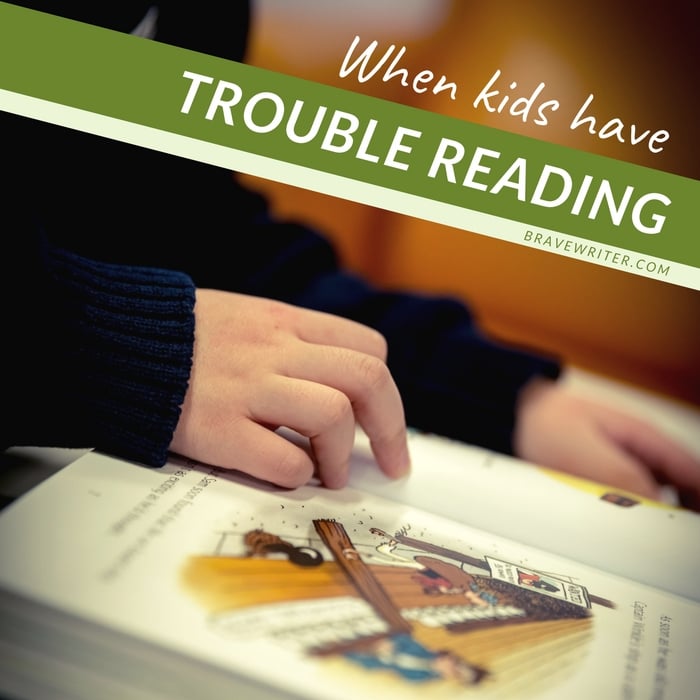When Kids have Trouble Reading

Abby asks:
Where would my 9 year old start? He really dislikes reading and writing. He also does not like books that are too young for him in content. He can read sort if, but doesn’t like to and seems to have trouble with the phonetics. I have tried the chunking method but I don’t know what I am doing and am met with much resistance by him. I am looking for help and a new direction.
Thanks!
Abby
Some kids just can’t get there as easily as others. My youngest was nearly 10 before reading clicked for her.
For Caitrin (my youngest), she got interested in Ancient Greek (I was studying it at the time). We learned the alphabet together. She suddenly saw how each letter had a sound in a way she didn’t grasp with English. Because I was sounding out with her and struggling with her, she started to match the sounds to the letters. Once she made that connection, something “clicked” and she started sounding out more easily for English. She never read readers and went straight to chapter books.
It may be that he is trying to “read” – to just breeze along in English the way all of us do, without realizing how he needs to patiently grasp the phonetics (painstaking, unnatural work). If you have a way to introduce a second alphabet (maybe even making your own code for the sounds – not the alphabet), he might see it as a game and start to see what reading actually is.
My other daughter had a different problem. She was struggling with all the different fonts. To her, an “a” in handwriting was not the same “a” as in typing. She couldn’t generalize and thought she was seeing multiple alphabets! She didn’t read until she was almost nine. When I figured out what was happening, I started having her circle the alphabet letter by letter in a variety of settings (books, articles, handwritten notes). I wanted her to recognize an “a” always sounded like an “a” no matter how it was written. Once she caught on to that, she read.

Keep noticing what’s going on with your son. If he is struggling with the patience to sound out, see if there is some other way he can get there. You might try writing him notes (using simple language) each night at bed time – a single question. Let him read it on his own away from your eyes. If he can decipher it, he can “get” whatever the question offers.
For instance, maybe you write: “Do you want a cookie?”
If he can read it, the next day he gets it.
Maybe: “Do you want to take a walk in the park?”
Then if he can get it, you go for the walk. Maybe you go anyway!
No need to punish him, but you might help him have some space to read alone without your prying eyes and anxiety pressuring him (that’s how we all feel when we are sitting with a late reader). Reading aloud to him is important as well.
You might also try The Wand (you can download a sample so you can take a look and see if it would work for him). Sometimes the kinesthetic approach works well with boys.
–Julie
Image of boy reading by Brave Writer mom, Marsha


















Different fonts is definitely a problem. I know playful fonts are fun, but I don’t understand why more people who make books for children don’t realize that they’re making it so much harder for these poor kids to read! Also, apparently someone convinced graphic designers that fonts with a high X-height (the imaginary middle line that a, o, etc fit under) are more legible… and my poor daughter can’t tell an a from a d in those fonts. 🙁
(http://opentype.info/blog/2012/04/10/x-height-and-legibility/)
I would screen him for dyslexia. We encountered the same issues with my son. Finding an orton-gillingham based tutoring program (Barton) completely changed our lives and my understanding of my boy. It has taken a while but he loves books and I have learned so much about the spelling rules that I am a better person for it.
My son had horrible reading problems. He was 10 and not making any progress. After testing he was found to have dyslexia which included very little sequential memory. I purchased the All About Reading program which uses all of the senses to sound out words. He finally started making progress.
He is now 12, is reading the Percy Jackson series, and loves it. He doesn’t read out loud as easily as he reads to himself but he is still progressing.
I also got him the All About Spelling program because he could not spell the simplest words. With the program he has been advancing slowly in spelling.
I always thought that at some point everything would click and my son would start to read fluently and be able to spell easily. That did not happen. What I did find out is when children have a learning disability it can be a long hard road of 2 steps forward and 1 1/2 steps back. Keep at it, try to be patient, and remember that he may not be a super-star reader but you can get him to enjoy reading.
Julie,
A resource we used for my son was early readers from High Noon Books. No fuzzy bunnies just books written for older students who are struggling to read. They were a fantastic resource. The books cover subjects that older students are interested in while maintaining a comfortable reading level for struggling students.
http://www.highnoonbooks.com/index-hnb.tpl
Thanks for all these thoughtful comments!
–jb
My late reader was finally doing ok, but adding the Logic of English Foundations for spelling actually helped his reading also. He had never developed an intuitive grasp of the more complex phonics. When we were halfway through the program, we were reading a book together (he had to read the first 2 pages of each chapter), and as I correction him on a word (maybe imagination), he blurted out “How can ‘t’ say sh?” I assured him we’d get to that chapter soon!
He needed logical, specific instruction to make sense out of english. My older kids did not need this, but for him it has made a big difference.